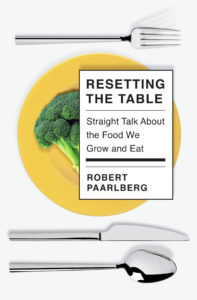
Robert Paarlberg’s RESETTING THE TABLE: Straight Talk about the Food We Grow and Eat (Knopf, February 2, 2021) is a bold, science-based corrective to the groundswell of misinformation about food and how it’s produced.
A descendant of Midwestern family farmers, Paarlberg examines in detail local and organic food, food companies, nutrition labeling, ethical treatment of animals, environmental impact, and every other aspect of the American food system from farm to table—and finds abundant reasons to disagree with the prevailing messaging to consumers to buy organic, unprocessed foods, sourced from small local farms. Global food markets have in fact improved the American diet. “Industrial” farming has greatly reduced environmental impact thanks to GPS-guided precision methods that cut energy use and chemical pollution, in addition to reducing land use while producing more crops. America’s very serious obesity crisis does not come from farms, or from food deserts, but from “food swamps” created by food companies, retailers, and restaurant chains. And, though animal welfare is lagging behind, progress can be made through continued advocacy, more progressive regulations, and perhaps plant-based imitation meat.
Paarlberg, an adjunct professor of public policy at the Harvard Kennedy School and the author of Starved for Science, Food Politics, and The United States of Excess, offers evidence-based solutions to the challenges of our food system today, ones that make sense for farmers and consumers alike. With RESETTING THE TABLE, he gives us a road map through the rapidly changing worlds of food and farming, laying out a practical path to bring the two together.
